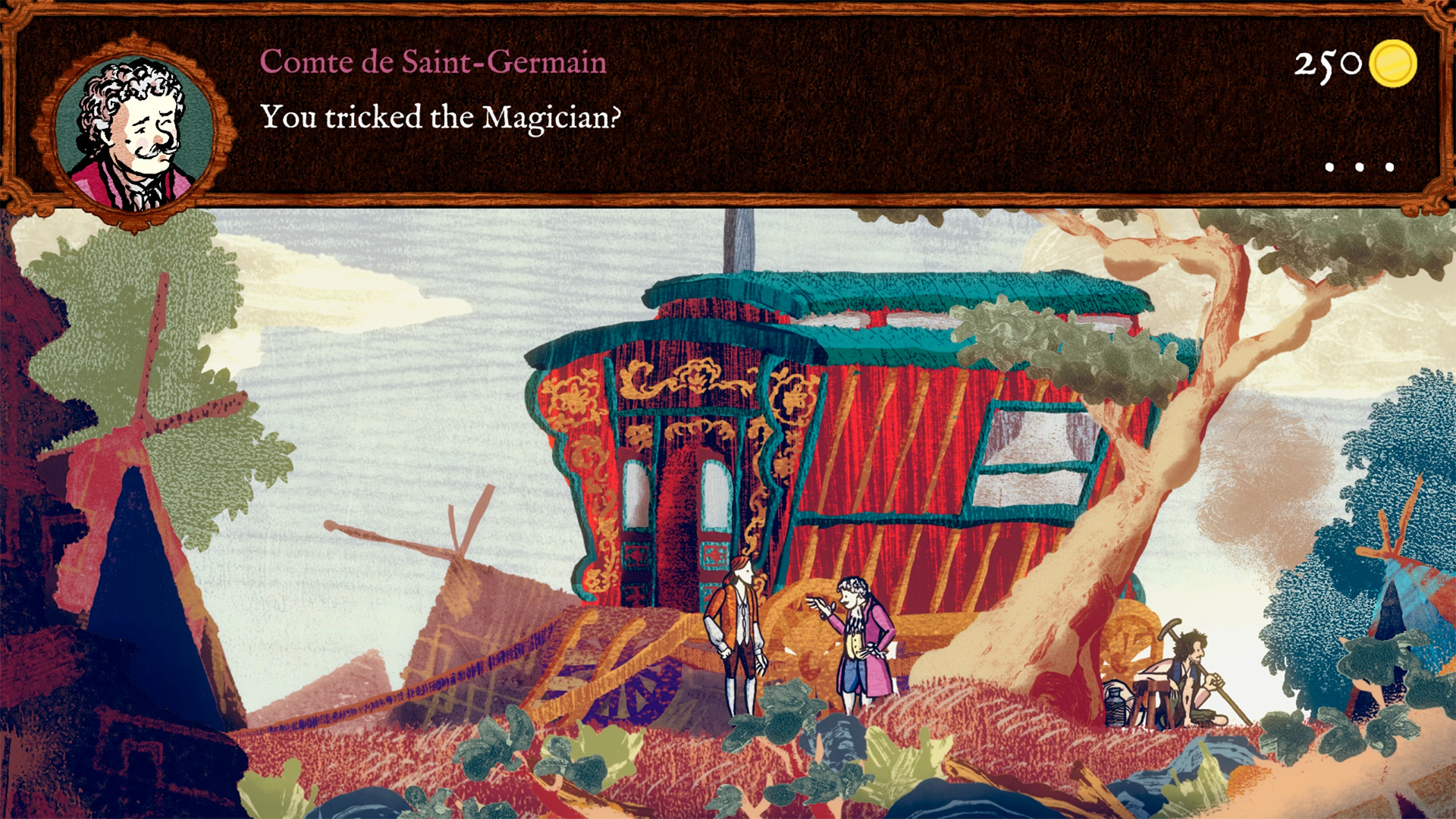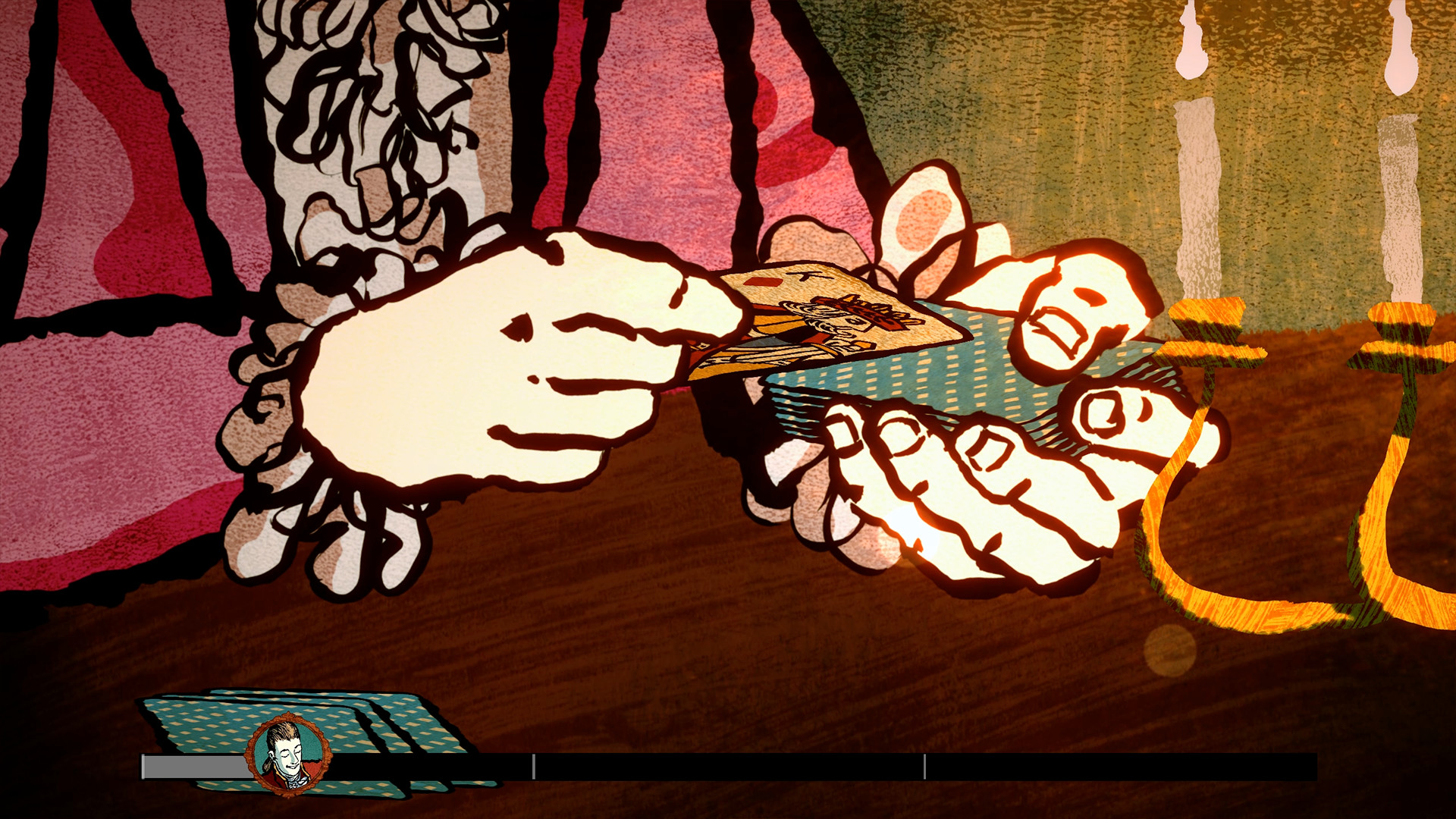Card Shark is a love letter to history's best tricksters, scammers, and cheats
Card Shark's concept designer talks about the real card cheating techniques behind Nerial's upcoming adventure.
We all love the feeling that we've gotten away with something. Whether it's writing the test answers on the inside of your pencil case in school, pushing an armful of free breadsticks into your bag even though it's only one per person, or smoothly talking your way out of being identified as the imposter in a certain overwhelmingly popular online deception game—it feels great.
Nerial's upcoming adventure game Card Shark is the epitome of that feeling. You play as a quick-handed cheater trying to climb high society in 18th century France by beating nobles in games of cards. Alongside your partner and accomplice, the tricky Count of St. Germain, you travel from location to location across France, swindling politicians and royals out of their riches through a number of deviously clever card techniques.
You won't just be dealing out your dirty tricks on the table though, Card Shark's themes of deception and treachery will also be explored off the table. "It's a story of intrigue where people backstab each other," Card Shark's Nicolai Troshinsky says. "There's conspiracy, lying, people pretending to be other people—all that sweet stuff"

Troshinsky is Card Shark's lead artist, animator, and concept designer. He has an adept knowledge of card tricks and cheating gimmicks throughout history and a big part of his role is translating those techniques into gameplay. Each cheat is portrayed as a mini-game, and each encounter features something new, or a variation of an existing technique with slightly different rules or slightly different goals.
"Early game techniques are very simple but very effective," Troshinsky says. "They are things that you could very easily do if you played with a group of friends or people who weren't too suspicious. The late-game techniques you would need years of practice to actually do, but in our game, we simplify them a lot. We're trying to capture the fantasy of being a trickster."
You'd think that in a game about swindling the rich, you'd get to play the Robin Hood figure and bask in your own greatness. But Card Shark switches that idea up, and instead, your role is much more subtle.
"In Card Shark, you play the side-man," Troshinsky says. "You never win. You need to get your partner to win effortlessly, that's the goal. You're the invisible force that creates success, but you never take the glory."
Keep up to date with the most important stories and the best deals, as picked by the PC Gamer team.

Playing as a silent phantom is an interesting role. Stealing cards, manipulating the deck, marking cards, secret signals—there are plenty of techniques to learn, but the most effective one Troshinsky tells me, is having an accomplice at the table, and that's your secret weapon in Card Shark.
You never win, your partner always wins, that's the goal. You're the heathen, the invisible force that creates success, but you never take the glory. You always make your partner when effortlessly
Nicolai Troshinsky, Nerial
"The easiest and most effective technique at any level is passing information secretly on the table," Troshinsky says. "Most cheating happens in collusion where nobody knows you're playing together. Establishing a code to communicate with your partner gives you a massive advantage."
Silent communication can be done through a number of different techniques. You can cheat off the table, playing as a discreet waiter serving wine and taking peeks at the opposition's hand, or on the table, directly manipulating the cards. I ask Troshinsky what the hardest technique is when cheating at cards and how it plays out in the game.
"A really hard cheat is arranging the deck as you shuffle it," Troshinsky says. "You make it look like you're genuinely shuffling it, but in reality, you're shuffling specific amounts of cards. The trick is moving precise amounts of cards at precise times, in order for specific cards to land in certain positions, so when the deal happens, they'll be dealt directly to the person you want."
The devil is in the details. Troshinsky further explains that the shuffle part of this technique is relatively easy if you do it slowly, but, "what takes years to learn is how to make it look like a natural shuffle."
In Card Shark, this technique is introduced later in the game when players have a better understanding of certain cheats, including how to execute them in a perfect chain. Mini-games are carried out in sequences of techniques to get the exact set-up you need for your partner to win. Troshinsky offers an example of of of these chains: the set up here is that a round has just finished and the cards are on the table ready to be collected for the next deal.
"The first technique in the chain is to gather the cards on the table in a specific order," Troshinsky says. "You pretend to just gather them, but you take care in which order you collect them in, so you're able to reserve specific cards for your accomplice. The next is a false shuffle, where you need to keep the cards in a specific place. You shuffle the bottom cards, but you leave the top cards in order. Then after you complete that, you have a false cut. You pretend to cut the cards, but, again, keep them in a specific order for when you deal, it's like a variation of the shuffle. That would be a complete chain."
You can fail mini-games from messing up your timing or selecting the wrong cards, but depending on the situation, you'll have moments to recover. From the look of the trailer, you do not want to be caught red-handed in a time period where casually carrying firearms was totally okay.
If you're curious about the real practitioners behind these techniques, Card Shark makes sure to give them little cameos throughout the game, but it also gives a nod to famous con men and scammers throughout history. One such person is General Gregor McGregor, who travelled to England and claimed to have conquered a non-existing country—selling land from said country to rich nobles. Another is 'Count' Victor Lustig who is known for his get-rich-quick schemes and was famous for 'selling' the Eiffel Tower not just once, but twice.
Card Shark puts you in the role of the ultimate con artist while spotlighting the mischievous antics of famous swindlers, but it also explores the themes surrounding cheating in depth.
"The game is centered around cards, 100%, but we do take the opportunity to talk about deception, lies, and greed," Troshinsky says. "We try to approach the narrative and the people you encounter from a number of aspects, from politicians to petty thieves, mystics, and scammers. When is it okay to break rules and how much is too much?"
Card Shark doesn't have a specific release date, but developer Nerial is aiming for sometime this year.
Rachel had been bouncing around different gaming websites as a freelancer and staff writer for three years before settling at PC Gamer back in 2019. She mainly writes reviews, previews, and features, but on rare occasions will switch it up with news and guides. When she's not taking hundreds of screenshots of the latest indie darling, you can find her nurturing her parsnip empire in Stardew Valley and planning an axolotl uprising in Minecraft. She loves 'stop and smell the roses' games—her proudest gaming moment being the one time she kept her virtual potted plants alive for over a year.


